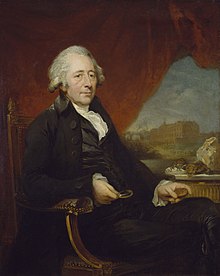Matthew Boulton
| Matthew Boulton | |
|---|---|

1792 portrait of Matthew Boulton
|
|
| Born |
3 September 1728 Birmingham, England |
| Died | 17 August 1809 (aged 80) Birmingham, England |
| Occupation | Manufacturer |
| Spouse(s) | Mary Robinson (d. 1759), Anne Robinson |
| Children | Three daughters who died in infancy, Anne Boulton, Matthew Robinson Boulton |
| Parent(s) | Matthew Boulton, Christiana Boulton née Piers |
| Relatives |
Matthew Piers Watt Boulton (grandson) |
| Awards | Fellow of the Royal Society (1785), High Sheriff of Staffordshire (1794) |
Matthew Boulton FRS (/ˈboʊltən/; 3 September 1728 – 17 August 1809) was an English manufacturer and business partner of Scottish engineer James Watt. In the final quarter of the 18th century, the partnership installed hundreds of Boulton & Watt steam engines, which were a great advance on the state of the art, making possible the mechanisation of factories and mills. Boulton applied modern techniques to the minting of coins, striking millions of pieces for Britain and other countries, and supplying the Royal Mint with up-to-date equipment.
Born in Birmingham, he was the son of a Birmingham manufacturer of small metal products who died when Boulton was 31. By then Boulton had managed the business for several years, and thereafter expanded it considerably, consolidating operations at the Soho Manufactory, built by him near Birmingham. At Soho, he adopted the latest techniques, branching into silver plate, ormolu and other decorative arts. He became associated with James Watt when Watt's business partner, John Roebuck, was unable to pay a debt to Boulton, who accepted Roebuck's share of Watt's patent as settlement. He then successfully lobbied Parliament to extend Watt's patent for an additional 17 years, enabling the firm to market Watt's steam engine. The firm installed hundreds of Boulton & Watt steam engines in Britain and abroad, initially in mines and then in factories.
Boulton was a key member of the Lunar Society, a group of Birmingham-area men prominent in the arts, sciences, and theology. Members included Watt, Erasmus Darwin, Josiah Wedgwood and Joseph Priestley. The Society met each month near the full moon. Members of the Society have been given credit for developing concepts and techniques in science, agriculture, manufacturing, mining, and transport that laid the groundwork for the Industrial Revolution.
...
Wikipedia
